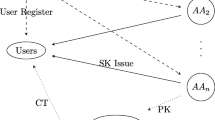Abstract
Cloud can provide storage space and services for data owners to host their data, where data privacy and confidentiality become critical issues. Ciphertext policy attribute-based encryption (CP-ABE) is one of the most suitable methods to protect data privacy and provide structured access control. In this paper, we propose a multi-authority CP-ABE scheme with a direct attribute revocation mechanism, cause revocation is an inevitable problem in the application process. Under our proposed revocation mechanism, the remaining users need not to update their secret keys when revocation happens. It relies on the matching of public keys’ version and ciphertext’ version. In a cloud storage model, the update of ciphertext is executed by public cloud, which cannot be fully trusted by data owners. In this case, we propose a hybrid CP-ABE cloud storage model aiming at solving the public cloud trust management problem. The data owners can authorize private cloud to verify whether their ciphertexts have been updated to the newest version. In addition, we prove our construction secure in selective-CPA model. Finally, we compare our scheme with similar multi-authority CP-ABE schemes from functionality, communication overhead and computation cost. The simulation results show that our scheme is more efficient than similar works in encryption, decryption and revocation stages.



Similar content being viewed by others
References
Lee, C.-C., Chung, P.-S., & Hwang, M.-S. (2013). A survey on attribute-based encryption schemes of access control in cloud environments. IJ Network Security, 15(4), 231–240.
Yang, K., Jia, X., Ren, K., Zhang, B., & Xie, R. (2013). Dac-macs: Effective data access control for multiauthority cloud storage systems. IEEE Transactions on Information Forensics and Security, 8(11), 1790–1801.
Bethencourt, J., Sahai, A., & Waters, B. (2007). Ciphertext-policy attribute-based encryption. In 2007 IEEE symposium on security and privacy (SP ’07), pp. 321–334.
Attrapadung, N., & Imai, H. (2009). Attribute-based encryption supporting direct/indirect revocation modes. In IMA international conference on cryptography and coding, Springer, pp. 278–300.
Yang, K., Jia, X., et al. (2013). An efficient and secure dynamic auditing protocol for data storage in cloud computing. IEEE Transactions on Parallel and Distributed Systems, 24(9), 1717–1726.
Li, J., Yao, W., Zhang, Y., Qian, H., & Han, J. (2017). Flexible and fine-grained attribute-based data storage in cloud computing. IEEE Transactions on Services Computing, 10(5), 785–796.
Attrapadung, N., & Imai, H. (2009). Conjunctive broadcast and attribute-based encryption. In International conference on pairing-based cryptography, Springer, pp. 248–265.
Hur, J., & Noh, D. K. (2011). Attribute-based access control with efficient revocation in data outsourcing systems. IEEE Transactions on Parallel and Distributed Systems, 22(7), 1214–1221.
Li, X., Tang, S., Lingling, X., Wang, H., & Chen, J. (2017). Two-factor data access control with efficient revocation for multi-authority cloud storage systems. IEEE Access, 5, 393–405.
Fan, C.-I., Huang, V. S.-M., & Ruan, H.-M. (2014). Arbitrary-state attribute-based encryption with dynamic membership. IEEE Transactions on Computers, 63(8), 1951–1961.
Yang, Y., Liu, J. K., Liang, K., Kim-Kwang, R. C., & Zhou, J. (2015). Extended proxy-assisted approach: Achieving revocable fine-grained encryption of cloud data. In European symposium on research in computer security, Springer, pp. 146–166.
Yang, K., & Jia, X. (2014). Expressive, efficient, and revocable data access control for multi-authority cloud storage. IEEE Transactions on Parallel and Distributed Systems, 25(7), 1735–1744.
Lai, J., Deng, R. H., Guan, C., & Weng, J. (2013). Attribute-based encryption with verifiable outsourced decryption. IEEE Transactions on Information Forensics and Security, 8(8), 1343–1354.
Li, J., Wang, Y., Zhang, Y., & Han, J. (2017). Full verifiability for outsourced decryption in attribute based encryption. In IEEE transactions on services computing.
Ma, H., Zhang, R., Wan, Z., Yao, L., & Lin, S. (2015). Verifiable and exculpable outsourced attribute-based encryption for access control in cloud computing. In IEEE transactions on dependable and secure computing.
Wang, H., He, D., & Han, J. (2017). Vod-adac: Anonymous distributed fine-grained access control protocol with verifiable outsourced decryption in public cloud. In IEEE transactions on services computing.
Chow, S. S. M. (2016). A framework of multi-authority attribute-based encryption with outsourcing and revocation. In Proceedings of the 21st ACM on symposium on access control models and technologies, ACM, pp. 215–226.
De Sourya, J., & Ruj, S. (2017). Efficient decentralized attribute based access control for mobile clouds. In IEEE transactions on cloud computing.
Wang, C., Chow, S. S. M., Wang, Q., Ren, K., & Lou, W. (2013). Privacy-preserving public auditing for secure cloud storage. IEEE Transactions on Computers, 62(2), 362–375.
Yu, Y., Au, M. H., Ateniese, G., Huang, X., Susilo, W., Dai, Y., et al. (2017). Identity-based remote data integrity checking with perfect data privacy preserving for cloud storage. IEEE Transactions on Information Forensics and Security, 12(4), 767–778.
Waters, B. (2011) Ciphertext-policy attribute-based encryption: An expressive, efficient, and provably secure realization. In International workshop on public key cryptography, Springer, pp. 53–70.
Lewko, A., & Waters, B. (2011). Decentralizing attribute-based encryption. In Annual international conference on the theory and applications of cryptographic techniques, Springer, pp. 568–588.
Chase, M. (2007). Multi-authority attribute based encryption. In Theory of cryptography conference, Springer, pp. 515–534.
Acknowledgements
We are grateful to the authors of the bibliography for their work. This paper is partially supported by National Natural Science Foundation of China (Grant Nos. 61502044).
Author information
Authors and Affiliations
Corresponding author
Additional information
Publisher’s Note
Springer Nature remains neutral with regard to jurisdictional claims in published maps and institutional affiliations.
Rights and permissions
About this article
Cite this article
Yu, P., Wen, Q., Ni, W. et al. Decentralized, Revocable and Verifiable Attribute-Based Encryption in Hybrid Cloud System. Wireless Pers Commun 106, 719–738 (2019). https://doi.org/10.1007/s11277-019-06187-3
Published:
Issue Date:
DOI: https://doi.org/10.1007/s11277-019-06187-3





